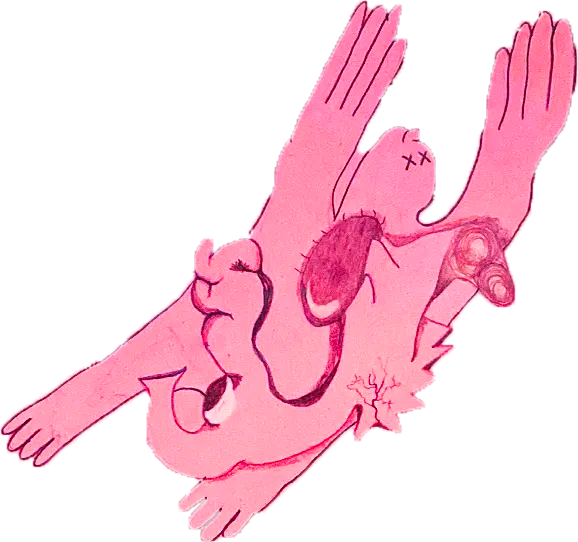WE RESPECT HARMONY KORINE
Mike Bilandic
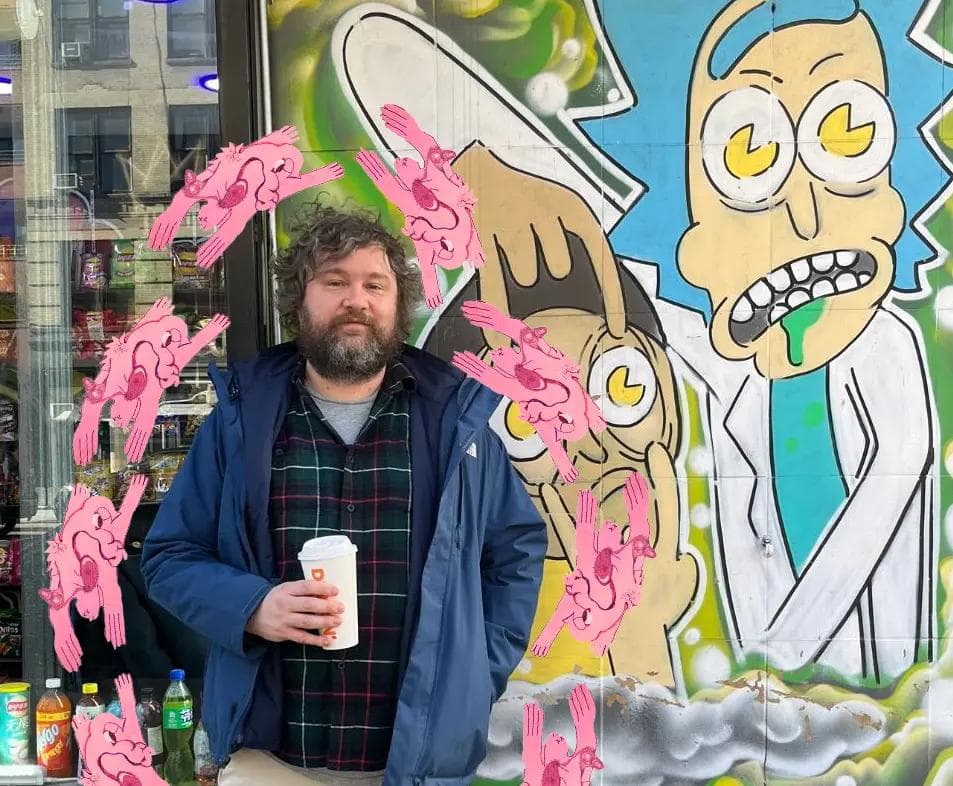
The main goal of art is to elicit some kind of emotion. I hate to use this word, but, empathy. People are so obsessed with technology and making sense of the present situation of things, but there’s no sense of emotion attached to it.
TESS POLLOK: I’m so excited to be talking to you because I just watched Jobe’z World last night so the whole thing is fresh in my mind. So, Jobe’z World is a microbudget feature you directed in 2018 that’s just now getting a Blu-Ray release. There’s also an upcoming screening at Metrograph on Thursday, March 28. Although they might move it, so stay tuned. What were you thinking about when you made Jobe’z World?
MIKE BILANDIC: It was definitely a combination of things. One of the biggest ones was celebrity deaths and peoples’ reactions to them. I don’t remember the exact order, but people like Philip Seymour Hoffman and David Bowie, it kind of amazed me how everybody had to visibly show how their lives were over because these people had died. People were more distraught than if their own kid had died. I started thinking about how the worst case scenario would be if you were responsible for one of these celebrity deaths. Philip Seymour Hoffman was the genesis of that kind of thinking because people really blamed his drug dealer. When a person dies, there’s always this race on social media to figure out who did it–people just can’t accept the fact that sometimes people just O.D. and die, there’s always this obnoxious, like, “Let’s catch the murderer!” mentality. I mean, it’s one thing if you knowingly sell drugs that have fentanyl in it, but that’s not the case in most of these situations.
POLLOK: I completely agree. People have a hard time understanding that there are tragic accidents in the world and it just isn’t anyone’s fault. Or that the seeds of someone’s self-destruction may already be ingrained in their behavior and that so many variables play into bad outcomes for people.
BILANDIC: Exactly, and it takes away from the agency of the person who died. So, making the film, I was just creating the worst case scenario of how life could go in my head: what if you were accidentally responsible for the death of a beloved celebrity? That’s mostly how my process works, mixing a morbid thought I have with a pragmatic explanation of how things would actually go. It takes place over the course of one night, one night in New York City, where this character who’s a drug dealer accidentally kills a celebrity and it has that sort of, going person-to-person structure within it. I was dealing with the internet at that particular moment in time and my fear of the worst case scenario.
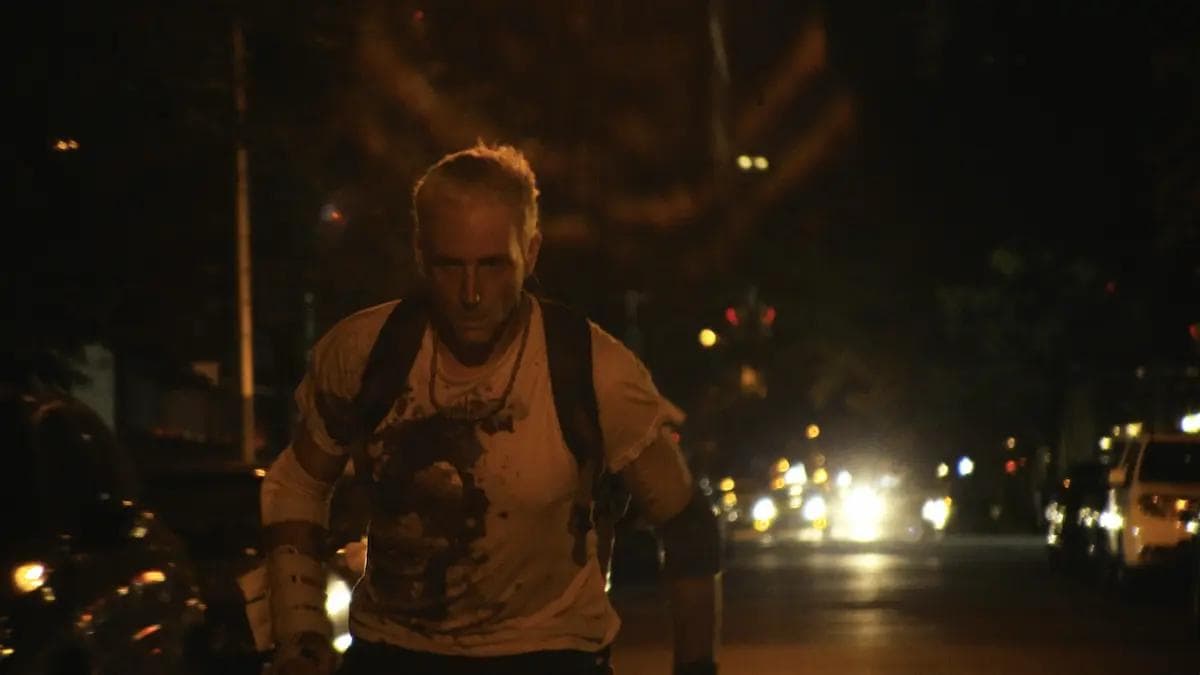
Still from Jobe’z World
POLLOK: I also think there’s sometimes an antagonistic and voyeuristic attitude towards how people try to take ownership over their grief of a celebrity’s death, as if they’re in competition over who was the biggest fan or who knew them best. That was a big thing with my generation, with the death of Lil Peep, it just turned into this huge dick-swinging contest into who knew first and how many degrees removed from him they were, it was just tragic. Or with Kobe Bryant, which was unthinkably tragic, people turned it into a competition to see who was the most LA.
BILANDIC: Social media always finds a way for people to make it about themselves. That was one of the things I was thinking about in terms of the death scene in the movie because this guy is a Hollywood actor who dies and this guy ends up live streaming his death–and that’s his moment where he becomes a director and a cinematographer. When the movie came out I was really thinking about James Franco going to college and these other celebrities who, you know, have this magical thinking where they think they can be everything. It ushered in this moment where everyone was like, I’m a sculptor, I’m an architect, I’m an actor–but I’ve never made anything, or built anything, or been in anything.
POLLOK: A lot of your earlier work is concerned with that as well.
BILANDIC: Yeah. Making music, making movies, writing novels, writing poetry–we’ve reached this place where as long as you get the right amount of likes and engagement it doesn’t matter if you’re doing it well or even doing the actual thing. That was definitely on my mind making the film, the empowerment people get from branding themselves, and the negative consequences of that kind of thinking.
POLLOK: Yeah, we recently did an interview with Natasha Stagg, whose new book, Artless, is basically a series of essays and dispatches on exactly that–her fascination with the personal brand. I think her book Surveys was really prescient because she basically documented the rise of the influencer back in 2016–it was about a girl who realizes she can monetize her online persona instead of having a job, she becomes ambiguously famous.
BILANDIC: The history of the monetization of social media is such an interesting one. I was just thinking the other day about this guy called the Sultan of Scottsdale, do you remember him? He was, like, the Cobrasnake of this random party town in Arizona. He was a nightlife EDM photographer. But he was one of the first people on Facebook to buy a million followers. So, in terms of metrics, he was the biggest photographer in the world, just for a minute.
POLLOK: I think what makes me saddest about it is that it’s a less competitive ecosystem for artists so the art turns out worse. That’s been my feeling about the state of contemporary literature for a long time. There’s a high population of people who just aren’t doing anything, which is saturating the environment with that energy, and among the people who do, the observations are very surface-level.
BILANDIC: I’m glad you brought this up because I have a theory about this that no one believes. Not one person on earth has agreed with me about this. But have you seen The Beach Bum by Harmony Korine?
POLLOK: No, but I’ve been meaning to. It’s getting rave reviews on my Letterboxd.
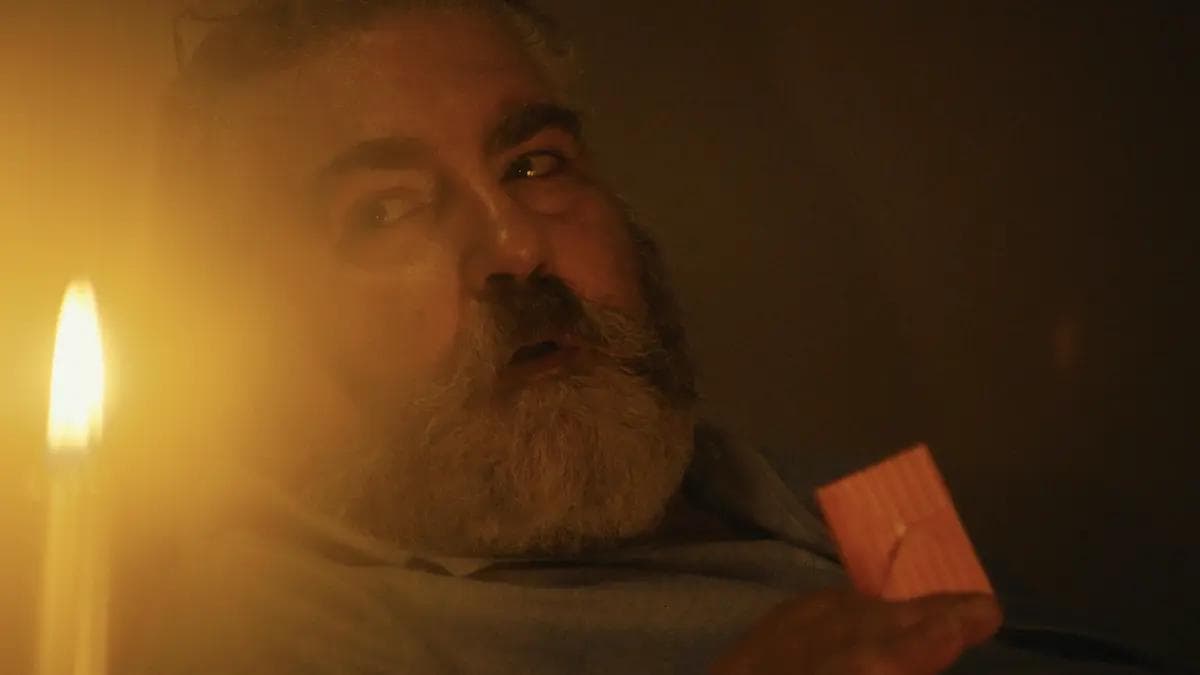
Still from Jobe’z World
BILANDIC: I saw it at Metrograph a few days ago and it was fucking fantastic. Matthew McConaughey stars as this middle-aged poet who’s just living his best life, partying all the time with no consequences for his actions. It made me think about how poetry in the ‘60s was really free-spirited and cool, then in the ‘90s it was more about slam poetry, which I felt was more embarrassing–but, all this to say, I think the current trend of all these poetry and literary journals coming out is indebted to The Beach Bum.
POLLOK: You don’t attribute that just to the pandemic generally? The disruption to people’s careers and access to unemployment, free time?
BILANDIC: I see that. I just also think that Harmony’s dictated so much of culture in the past. The Beach Bum rolls in, suddenly there’s tons of contemporary poetry. I re-watched Spring Breakers recently and was just amazed at how ahead of its time it was.
POLLOK: What’s your filmmaking process like?
BILANDIC: I take a lot of inspiration from where I live in Greenwich Village. I like just walking around, seeing people, and speculating on what their life might be like. My earlier film Happy Life was born out of, you know, walking by a store every day and just imagining what goes on in there. I’m almost finished with something now that takes place in a boutique gym. There’s one right by my house that has all these biohazard signs everywhere and I’m absolutely fascinated by it. But, yeah, I think walking around and imagining what people’s lives are like–that’s the genesis of my work.
POLLOK: I think you’re ahead of your time with the boutique gym thing. A lot of people are writing about Equinox. Who are some of your favorite filmmakers and who do you think influences your filmmaking the most?
BILANDIC: Fassbinder, although that’s pretty obvious. He’s the man. The way his films are entertaining but also so hardcore, you know, it’s huge. Paul Morrissey is a gigantic influence on me in terms of comedy, satire, and the structure of jokes. But my inspirations are everywhere. I love, you know, YouTube videos and TikToks and whatever.
POLLOK: It’s so interesting that the instinct behind your work is so humanist because a lot of it feels really cynical.
BILANDIC: The main goal of art is to elicit some kind of emotion, or, like, I hate to use this word, but empathy. I think there’s a thing now where people are obsessed with the present tense and technology, which is fine, but there needs to be some emotion attached to it to qualify it as art–how are these things you’re making affecting people? It’s a weird thing I’ve been thinking a lot about. Even with releasing a Blu-Ray, I wonder if I’m being nostalgic with that or clinging to something–it’s taken me time to realize that everything is in the present, you know? Like, I’m really into ‘90s dance music, and that is contemporary music for me, because it’s what I’m listening to now. In the ‘90s there was That ‘70s Show, and no one who was watching that in the ‘90s thought it was the ‘70s. If you’re watching something and you’re processing it, it’s new. Nostalgia isn’t real.
POLLOK: Yeah, I mean, this is a super dumb reference because South Park is really reaching the end of its shelf life, but they had a whole season recently where the enemy was nostalgia.
BILANDIC: It’s fake. Nostalgia isn’t real. Every single person has these feelings. Every single person thinks that when the world was a kid, it was better. There’s no way around it and you can’t break that emotion, so who gives a fuck? Just embrace it. Some people become losers, other people get nostalgic for shit that you personally think sucks, you know, and it just keeps going. It’s just not something worth losing sleep over. But even I lose sleep over it.
POLLOK: Relatable. Well, I’m curious about your relationship to dreams and ambitions, because I feel like a lot of your movies, Jobe’z World and Happy Life included, poke fun at people’s frustrated aspirations and ambitions for their lives.
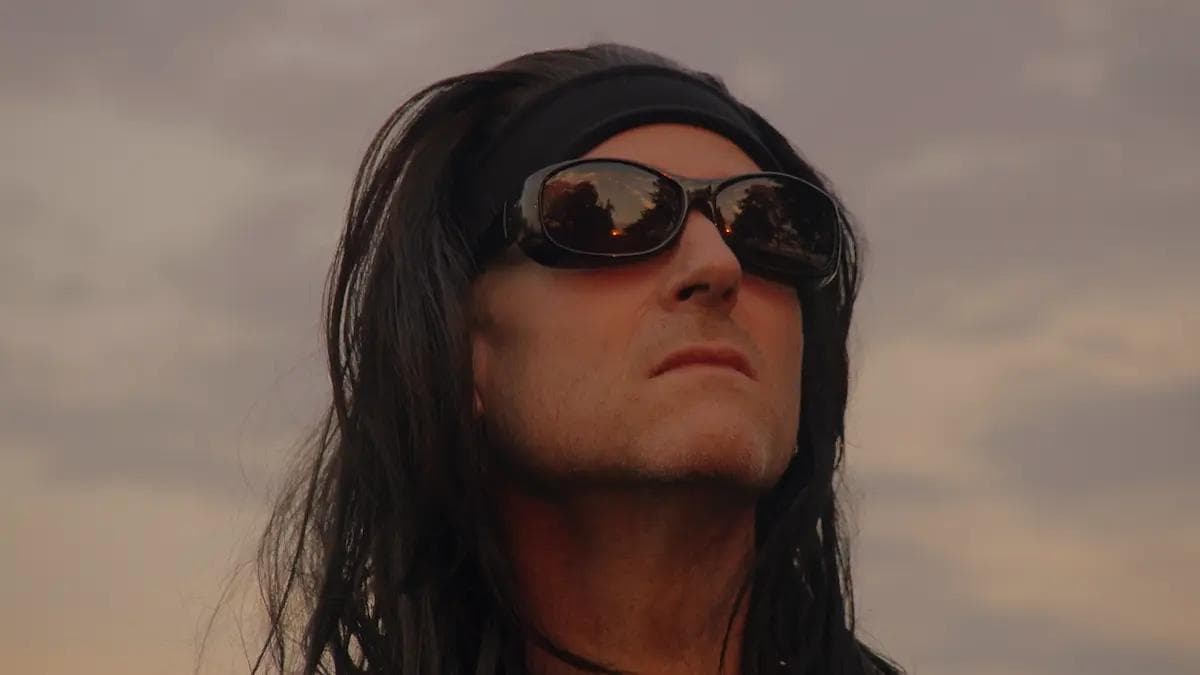
Still from Jobe’z World
BILANDIC: Yeah, they are similar in that way. In Happy Life, this record store guy, he has a vision of the future, he’s trying to see his way in the world–he thinks he’s the man, you know? In Jobe’z World, too, he has this vision that he’s all that and that he can project his status, that eventually he will be the fucking man. I think that just comes from my own anxieties. [Laughs] My own anxieties about wanting to be the fucking man all the time. But it’s pretty blind to think that way. You know, to make a film, you really have to have a decent sense of time. Writing a poem–that takes, like, ten minutes; writing a song, I’m not sure, but it still happens in real time. Making a movie takes years. I think filmmaking involves having a realistic and pragmatic sense of the future just because of the effort required to make films. That’s why you don’t see big filmmakers with face tattoos, because they know how to think ahead. Or, at least, they used to, that’s not really that big of an issue anymore. It used to be an impulse thing. But it’s a long process, one that makes you regard time and ambition differently, I think.
POLLOK: I think a lot about the mental differences across people who work in different artistic mediums, like, I have a hard time interviewing musicians because I feel like they’re so vibe-based that expressing themselves in language is difficult for them.
BILANDIC: It’s true. Reading interviews with musicians is not the most fun. You know what I really like? Boomer filmmakers. Abel Ferrara, Paul Schrader, John Waters. They’ve got their comedy routine down and they’ve done it a thousand times. I really go for that: a nice elderly person cracking up the room, personally.
POLLOK: Do you go in for commercial cinema?
BILANDIC: Not really. I haven’t seen an Oscar movie in the last five years, I don’t really like that stuff. Like, I’ve never seen a Yorgos Lanthimos movie, whatever that is. I like variable stuff, just stuff that’s on at the theater. My friends Nick and Sean do a blind screening series called City Dudes at the Roxy and it’s really my favorite thing, to not know the movie I’m about to see and it’s always something interesting. That’s been fun.
POLLOK: I also wanted to ask about the role New York plays in your films, since most of them are set there. What fascinates you the most about New York?
BILANDIC: I’m from Chicago and I moved here in the early ‘00s. It’s funny you say that because this guy I know, Matt Shaw, he’s an architecture critic, he invited me to speak to some architecture students this year and I was, like, I don’t know shit about architecture, but it did make me think about high concept, low budget movies where the city is the stage. Low budget movies tend to use real locations instead of using production design. I worked on Chelsea on the Rocks and it all took place in the Chelsea Hotel and, you know, there was no plan. The story was just, we’re going to make a movie in the Chelsea Hotel. That’s the main character. Movies have architecture to them, parameters, and space as a starting point. It makes sense from a low budget perspective because you save money when you shoot in real places, but it’s also given me the mindset that when considering a film I always think about the location from the very beginning. I shoot a lot of my movies in my own apartment. So architecture is a huge part of it, in a way.
POLLOK: How did you get started filmmaking in New York?
BILANDIC: I went to undergrad at the University of Texas at Austin, which was a weird experience, growing up in Chicago. People in Chicago are prone to hater-ish tendencies, quite often. Then I moved to Austin for three years where everyone, like, loves everything. It was kind of a weird scene but a great program. I went to NYU for grad school and really liked it here. I feel like there’s a nice middle ground to New York where everything’s more pragmatic and transactional. But what really got things started for me was working at Kim’s video. That was an old video store on St. Mark’s where I met my core group of friends and collaborators, Sean Price Williams was working there, Alex Ross Perry was working there. They were my inspiration for doing this whole Blu-Ray thing; I love to fetishize rare collectibles. I’m extremely excited about it.
Mike Bilandic is a writer and filmmaker based in New York City. He is the director of Hellaware, Happy Life, and Jobe’z World, among others. Jobe’z World is available now for the first time on Blu-Ray.
Tess Pollok is a writer and the editor-in-chief of Animal Blood.
← back to features
